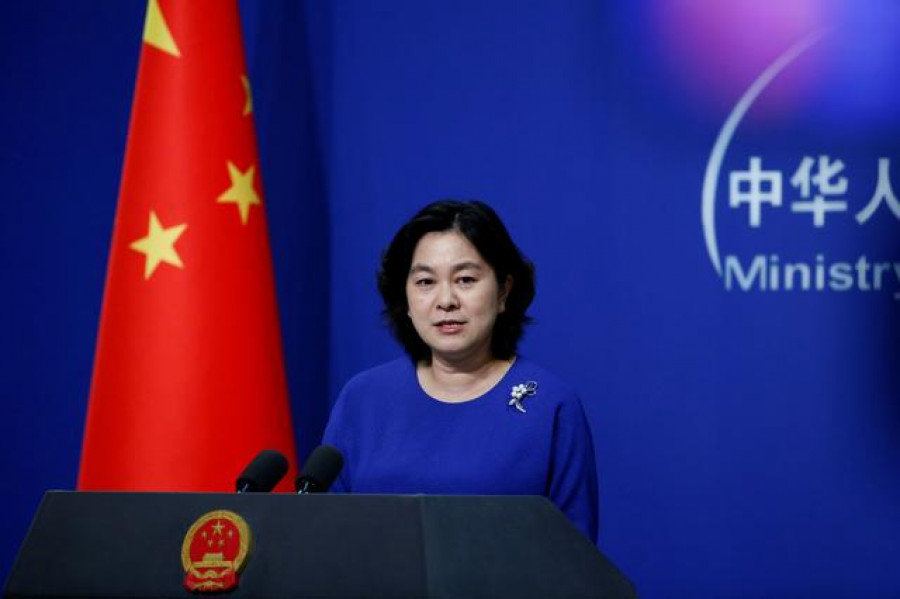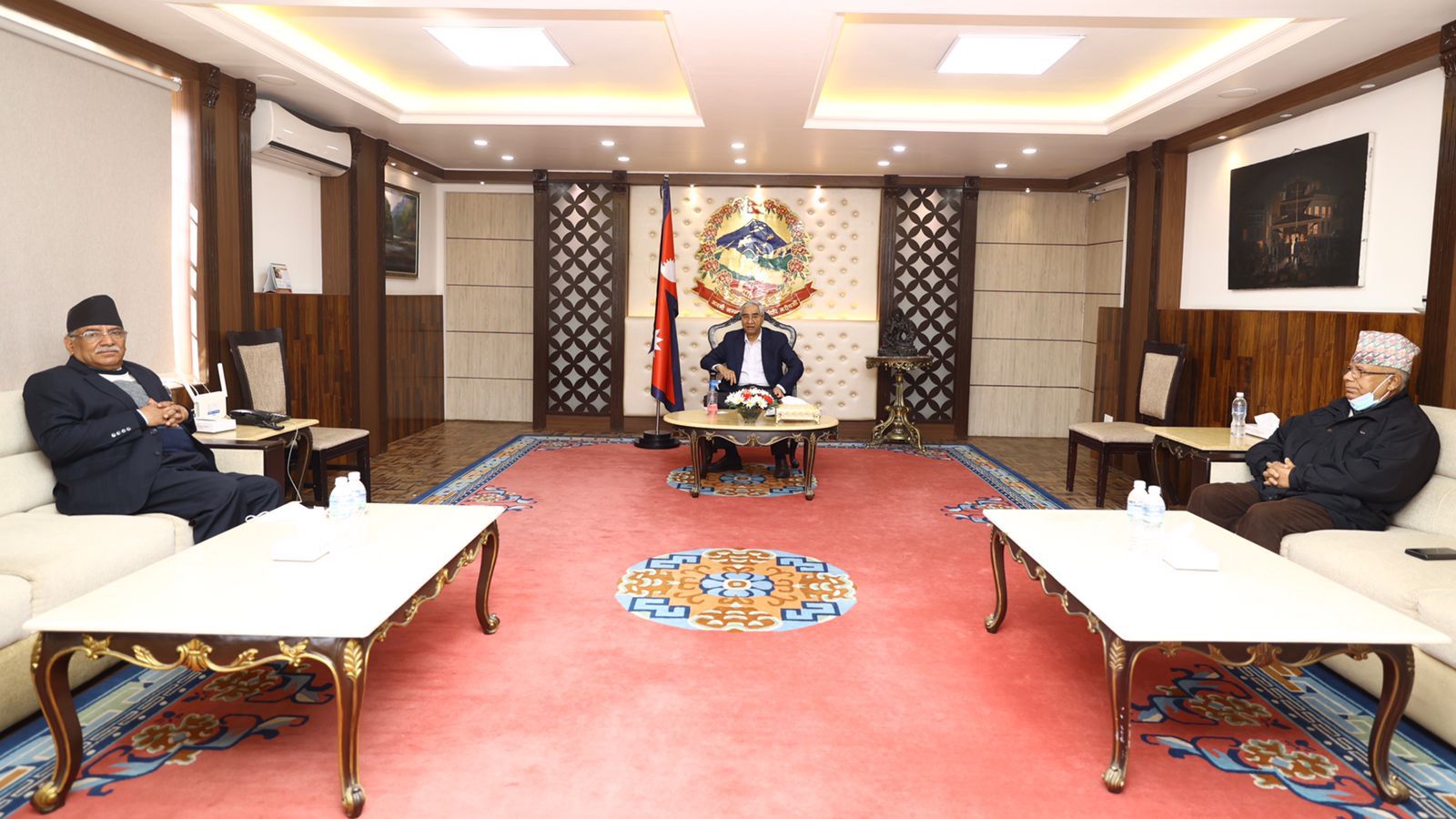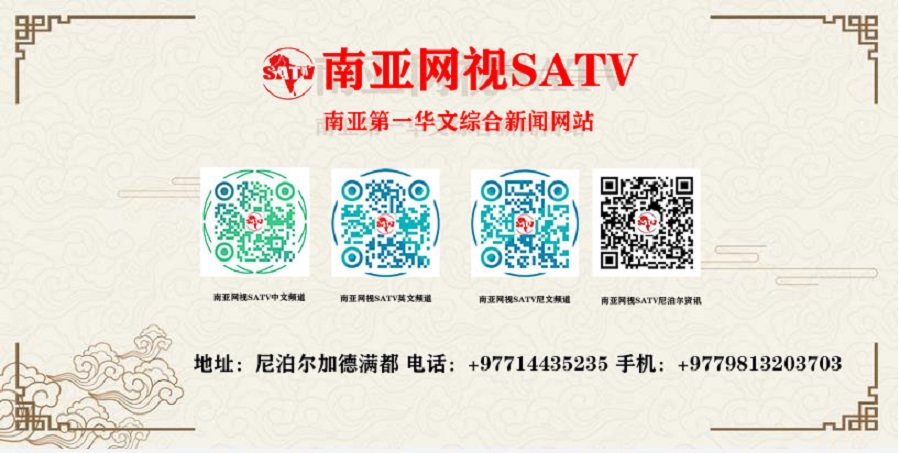
In this file photo, Chinese Foreign Ministry spokeswoman Hua Chunying speaks at a news conference in Beijing, China. Reuters
Amid the American ambassador’s hectic meetings with top Nepali political leaders following separate conversations with them on the Millennium Challenge Corporation-Nepal Compact, China has reacted once again, making the US grant a highly charged-up geopolitical issue in Nepal.
A day ahead of the scheduled deliberations in parliament on the compact—whether voting will also take place on Thursday is not clear yet—Beijing said on Wednesday why the Americans are setting a deadline for Nepal if the $500 million is a grant.
“How could a ‘gift’ be sent by an ultimatum?” said Chinese Foreign Ministry spokesperson Hua Chunying in Beijing on Wednesday.
The MCC compact is a multi-million dollar grant offered by the United States to Nepal for building electricity transmission lines and improving roads. Nepal signed up to the agreement in September 2017. The compact was registered in Parliament in July 2019.
After continued delays in its ratification, the United States recently set a February 28 deadline, saying it was requested by the Nepali leadership. Amid pressure, the Sher Bahadur Deuba government on Sunday tabled the compact in Parliament on Sunday, just as its coalition partners—the Maoist Centre and the CPN (Unified Socialist)—stand opposed to its ratification.

Immediately after talks with US Ambassador Randy Berry, Oli on Wednesday night held talks with Deuba at Baluwatar. RSSOn Tuesday, US Ambassador Randy Berry met with KP Sharma Oli, chair of the main opposition CPN-UML. Deuba also is seeking support of Oli as he is not confident about the support of his coalition partners. Immediately after talks with Berry, Oli on Wednesday night held talks with Deuba at Baluwatar.
What they talked about is sketchy.
Beijing’s remarks on Wednesday, however, makes it more clear that the MCC has fallen into a big geopolitical quagmire for Nepal.
“How could a ‘gift’ be sent by an ultimatum? How could people accept such a ‘gift’? Is it a ‘gift or a Pandora's box?’ Is it afraid that just as the old Nepali saying goes, it looks delicious, but it's actually a meat tough to chew,” said Hua.
She was responding to a question referring to a recent US embassy statement that said the $500 million grant under the MCC compact is a gift to Nepal.
The US embassy said on February 19 that the “$500 million MCC grant is a gift from the American people and a partnership between our nations that will bring jobs and infrastructure to Nepal and improve the lives of Nepalis.”
This project was requested by the Nepali government and the Nepali people and designed to transparently reduce poverty and grow the economy of Nepal, the embassy added.
MCC is viewed by many in Nepal as an American attempt to counter China's Belt and Road Initiative (BRI) under which Beijing aims to expand its influence in Asia, Europe and Africa. Nepal signed up to the BRI in May 2017.

Washington has conveyed to Kathmandu that it would be forced to review its ties with Nepal if the Nepali political leadership fails to keep up with their commitments on the $500 million Millennium Challenge Corporation grant. RSSThe Chinese remarks come at a time when the opposers of the MCC, like the Maoist Centre and the Unified Socialist, are said to have been cultivated by Beijing.
After Washington’s allusion to China factor for the continued delays in MCC ratification in Nepal, Beijing now seems to have taken a countermove.
On February 10, during separate telephone conversations with Prime Minister Deuba, opposition party leader KP Oli and Maoist chair Pushpa Kamal Dahal, US Assistant Secretary of State Donald Lu warned that the US could review its ties with Nepal if MCC is not ratified by the House.
A section of the media reported that the US would see Chinese hand if Nepal failed to move the compact through Parliament.
On February 18 also, the Chinese Foreign Ministry warned that Beijing will oppose any “coercive diplomacy” and will support the Nepali people to choose their own development path as always.
The Chinese remarks on Wednesday ahead of the plan to start discussions on the MCC compact not just add to the confusion but also elicit some geopolitical connotations.
Nepali communists are usually considered to be close to the north while Prime Minister Deuba, also the president of the Nepali Congress, is said to have a better alignment with the Americans.
Deuba currently is in a fix, though.
All the key parties that he needs to work closely to get the American compact ratified are communists—one is the main opposition UML and others are his coalition partners, the Maoist Centre and the Unified Socialist.
If Deuba joins hands with the UML to ratify the compact, he has to break the alliance with the Maoist Centre and the Unified Socialist. But by keeping the alliance intact, Deuba is not in a position to have the numbers for ratifying the compact.

Deuba government's two key coalition partners, Communist Party of Nepal (Maoist Centre) and CPN (Unified Socialist), have maintained that they are opposed to the compact’s ratification without amendments to some of the provisions. RSSThe US side, according to sources, has hinted that it could allow some more time if the Congress and the UML decide to come together to pass the compact.
But the Chinese statement on Wednesday comes as a warning.
“China believes that international cooperation should uphold the principles of mutual respect and equality. It should fully respect the state sovereignty and the will of the people without interfering in each other's internal affairs. It should never attach any political conditions or selfish interests while damaging other countries' sovereignty and interests,” said Hua. “As a friendly neighbor and development partner to Nepal, China will continue to support the Nepalese people to choose their own development path and continue to provide support to and help Nepal's social and economical development within China's ability.”
Meanwhile, amid opposition from his coalition partners, the best option for Deuba to ratify the compact is the UML.
But there has not been any visible development, a UML leader said.
“Both Deuba and Dahal are putting psychological pressure on each other by pointing at us,” said UML’s deputy General Secretary Bishnu Rimal. “We have already put forth our preconditions before the Congress. We will support the MCC bid if the Speaker is removed. The ball is in the court of the Nepali Congress.”













